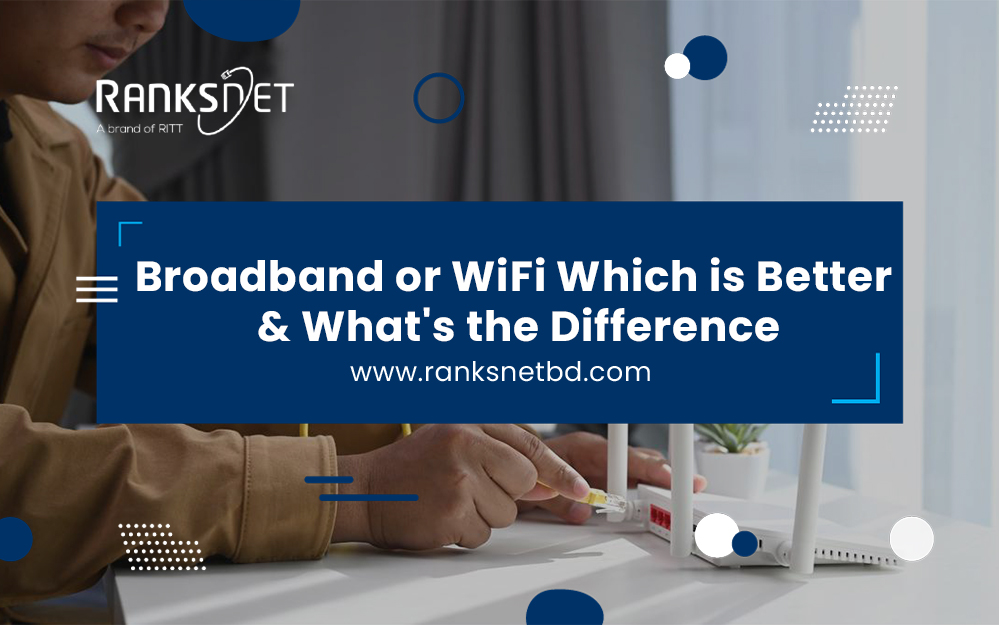In this digitally-driven world, staying connected is no longer a luxury but a necessity. A reliable and speedy internet connection is the key to smooth online experiences.
When it comes to internet connectivity, two terms often pop up: broadband and WiFi. But what’s the difference, and which one is better for your needs?
The choice between broadband and WiFi depends on your needs. Broadband is a high-speed internet connection delivered through various technologies, while WiFi is a wireless networking technology used to connect devices within your home or office.
Broadband provides the internet connection, while WiFi enables wireless access to that connection.
So, it’s not a matter of one being better than the other; they serve different purposes and can complement each other for a seamless online experience.
Let’s get into internet technology, exploring the contrasting aspects of broadband and WiFi to discover the differences!
Broadband vs. WiFi: A Comprehensive Comparison
Imagine the internet as a vast network of highways connecting you to the virtual world. Broadband and WiFi are like the vehicles that help you move on the digital highway.
What is Broadband
Broadband is like the superhighway of the internet. It’s a high-capacity data transmission method that can carry multiple signals simultaneously, providing a fast and consistent connection.
Broadband connections use various technologies, including Digital Subscriber Line (DSL), cable, and fiber optics, to deliver internet access to your home or business. Think of it as the road itself, the infrastructure that brings the internet to your doorstep.
What is WiFi
On the other hand, WiFi is like the car you use to travel on that superhighway. It’s a wireless technology that allows devices like smartphones, laptops, and smart TVs to connect to the internet without physical cables.
WiFi uses radio waves to transmit data between your devices and a WiFi router or access point, which in turn connects to the broadband network. So, while broadband is the highway, WiFi is the vehicle that gets you on it from the comfort of your home or wherever you are.
According to Speed
One of the most critical factors when evaluating broadband vs. WiFi is speed. After all, no one likes a slow internet connection, right?
-
Broadband
Broadband connections, depending on the type, can offer blazing-fast speeds. Fiber-optic broadband is known for its lightning-fast speeds that can reach up to 1 Gbps (Gigabit per second) or more.
This is like having a super-efficient mail delivery service, your internet content arrives at your device almost instantly, with no delays.
Cable and DSL broadband, while not as fast as fiber, still offer respectable speeds usually ranging from 25 Mbps to 500 Mbps. It’s like driving a sturdy SUV on the highway, not as flashy as a sports car, but it gets the job done efficiently.
-
WiFi
Now, let’s talk about WiFi speed. WiFi performance depends on several factors, including the distance from the router, the number of devices connected, and potential interference.
In ideal conditions, modern WiFi routers can deliver speeds of 1 Gbps or more, just like fiber-optic broadband. But in reality, your WiFi speed may vary.
Think of WiFi speed as driving on the superhighway during rush hour, you might hit some traffic (slowdowns) depending on the conditions.
If you’re far away from the WiFi router or have too many devices hogging the bandwidth, your internet speed can feel more like a leisurely Saturday drive than a high-speed chase.
Read our article to learn how to fix slow internet connection.
According to Coverage and Range
Another important aspect of the broadband vs. WiFi battle is coverage and range. After all, you don’t want to lose your internet connection when you move around your home or office.
-
Broadband
Broadband connections, like DSL or cable, are fixed in one location. The modem or router that connects you to the internet is typically installed in a specific room or area of your home or business.
This means that the range of your broadband connection is limited to the physical location of the modem or router.
-
WiFi
WiFi, on the other hand, offers the freedom to roam within a certain range. As long as you’re within the WiFi signal’s reach, you can move around with your laptop or smartphone and stay connected.
WiFi routers are designed to provide coverage throughout your home or office, but walls, furniture, and other obstacles can limit the range.
Suppose your WiFi is a magical bubble that surrounds your home, as long as you’re inside that bubble, you can enjoy internet access on your devices. Step outside the bubble’s range, and you might lose your WiFi connection.
Read more to learn good internet speed for home.
Convenience and Flexibility
When it comes to convenience and flexibility, WiFi takes the lead in the broadband vs. WiFi showdown.
-
Broadband
Broadband connections are tethered to a specific location. You can’t take your broadband connection with you on the go unless you have a mobile hotspot or a special arrangement with your internet service provider.
So, if you’re someone who needs internet access while traveling or working from various locations, broadband alone won’t cut it.
-
WiFi
As a wireless technology, WiFi provides the flexibility to access the internet from different rooms in your home or even from a coffee shop, airport, or hotel.
All you need is a WiFi-enabled device and a compatible network, and you’re good to go. It’s like having the ability to teleport your internet connection wherever you need it.
Reliability and Stability
When it comes to reliability and stability, both broadband and WiFi have their pros and cons.
-
Broadband
Broadband connections are known for their stability and reliability. Since they are hardwired into your home or business, they are less susceptible to interference from other electronic devices or physical obstacles.
Broadband also tends to have lower latency (delay) than WiFi, which is crucial for activities like online gaming and video conferencing.
Think of broadband as a reliable train service that sticks to its schedule – it may not be the fastest, but it gets you to your destination without hiccups.
-
WiFi
WiFi, while convenient, can be more susceptible to interference and signal drop-offs. If you have a lot of devices connected or if you’re in a crowded area with many WiFi networks, you might experience slower speeds and connection issues.
WiFi signals can also be affected by physical barriers like walls and floors, leading to dead zones in your home.
In a Nutshell
In the broadband vs. WiFi showdown, there’s no clear winner because these two technologies complement each other to create a dynamic duo that serves different aspects of your digital life.
Think of broadband and WiFi like two best friends who make sure you always have a good time online. They work together to keep you connected, whether you’re working hard, watching lots of videos, or just exploring the internet.
So, thanks to broadband and WiFi working together, your internet experience is better than ever. They’re like your digital buddies, making sure you have a blast every time you go online!
FAQ
How does broadband affect Wi-Fi speed?
Broadband speed affects the maximum Wi-Fi speed you can achieve. A faster broadband connection allows for quicker data transfer over Wi-Fi.
Can I use Wi-Fi with mobile data instead of broadband?
Yes, you can use mobile data for Wi-Fi via a mobile hotspot, but it may be more costly and have data limits.
Are there security differences between broadband and Wi-Fi?
Broadband typically has network security, while Wi-Fi needs its own security measures like passwords and encryption to protect your connection.
What’s the role of a router in broadband and Wi-Fi?
In broadband, a router connects to your internet service. In Wi-Fi, it broadcasts the wireless signal for your devices to connect.



